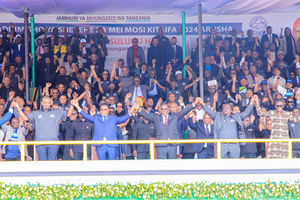Why govt differentiates banks’ local content participation

Deputy Minister for Minerals Mr Stanslaus Nyongo speaking at a seminar on local content in the extractive industry organised by KPMG on Thursday March o8, 2018. PHOTO|ALAWI MASARE
What you need to know:
- The issue emerged at a workshop organised by the consulting firm KPMG in Tanzania to sensitize and discuss local content issues in the extractives industry.
Dar es Salaam. The government has explained why it differentiates the use of local banks in petroleum and mining industries in its recent regulations governing the two sectors of the national economy.
The issue emerged at a workshop organised by the consulting firm KPMG in Tanzania to sensitize and discuss local content issues in the extractives industry.
Under the 2017 Petroleum (Local Content) Regulations published last May, companies are required to transact their businesses through a Tanzanian bank.
But according to the 2018 Mining (Local Content) Regulations, which became effective in January this year, the rules require mining firms to use indigenous Tanzanian banks.
A “Tanzanian bank” is defined in law as any bank licensed by the central Bank of Tanzania to conduct banking business. On the other hand, an “indigenous bank” is one that has 100 per cent Tanzanian shareholding – or, at least, a majority shareholding that is Tanzanian.
“We wonder why there is this difference in bank use in the two local content-related regulations because even a (wholly) foreign-owned bank can still be licensed by the central bank,” said Mr Noel Shiyo, associate partner at CBS Law Offices.
Mr Shiyo was supported in that by a partner at Stallion Attorneys, Mr Alkarim Hasham, in his presentation at the workshop.
However, the acting director general of the Petroleum Upstream Regulatory Authority (Pura), Mr Charles Sangweni, argued that the petroleum industry is more capital-intensive than mining. This factor influenced the Tanzanian authorities “to relax the use of banks for firms conducting petroleum activities”.
“The petroleum industry is capital-intensive…that’s why there is such a difference or contradiction in regulating the local content,” Mr Sangweni said by way of explantion.
The KPMG workshop involved different stakeholders from both the private and public sectors.
One of the challenges cited for the anxiety is poor understanding of the regulations. The grace period for complying with the petroleum regulations ended last December, while the mining regulations have been in place for only about three months since they were promulgated in January this year.
Other challenges are a shortage of local skilled workers and a limited capacity of local suppliers to meet the requisite standards of quality. In fact, some of them do not have certification from the regulators.
However, the government said it was able, willing and ready to help local companies to meet the quality standards required in the extractives industry.
“I thank KPMG for organizing this workshop to discuss the new regulations in the extractives sector. The government is committed to work with all investors, as well as the local companies in the sector… We will help local suppliers to meet standards as part of effort towards enabling local participation,” said Minerals deputy minister Stanslaus Nyongo.




